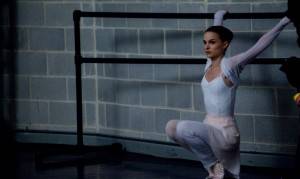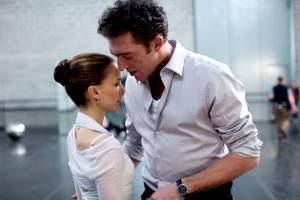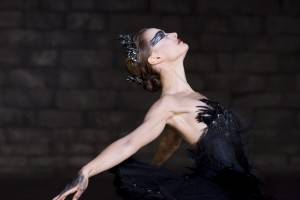Director Darren Aronofsky’s award-winning film Black Swan is a dark and disturbing psychological thriller, reminiscent of Alfred Hitchcock’s Marnie and Roman Polanski’s Repulsion, focusing on the highly competitive and pressurised world of the New York City Ballet.
Natalie Portman plays Nina Sayers, an immature and unworldly, aspiring prima ballerina who gets her big break when she is surprisingly cast in the lead role by the company’s director, Thomas Leroy (Vincent Cassel), an enfant terrible whose vision for Tchaikovsky’s Swan Lake is to have one artiste dance both the virtuous ‘White Swan’ and her evil twin, the ‘Black Swan’, conventionally two separate parts.
Nina resides with her overbearing mother, Erica (Barbara Hershey), herself a failed ballet dancer who tries to live out her former ambitions vicariously through her daughter’s drive and dedication. The seemingly chaste Nina is a natural choice to play the ‘White Swan’, but her relationship with her mother becomes strained when her sexual curiosity is awoken by her attempts to get in touch with the seductive traits of the ‘Black Swan’.
The chauvinistic Leroy, who had a fling with the recently retired leading dancer Beth Macintyre (Winona Ryder), thinks he can coax Nina into character by flirting with her and encouraging her to masturbate in order to loosen up and explore her sexuality, using the example of the new girl Lily (Mila Kunis) as a role model and potential rival for the part if she fails to deliver the goods. Although Aronofsky claims it wasn’t a direct influence, its hard not to compare it to the Powell and Pressburger classic, The Red Shoes, particularly the similarities between the tyrannical impresario Boris Lermontov (Anton Walbrook) and Cassel’s Leroy.
Desperate to succeed and prove herself, Nina goes against her mother’s wishes and lets Lily take her out for the evening. They end up in a club where she allows Lily to spike her drink so she can lose her inhibitions with a view to understanding what it feels like to be the ‘Black Swan’. Aside from accurately aping the plot of Tchaikovsky’s Swan Lake, the film is a clever metaphor for the feminine struggle with sexual awakening, identity, and freedom; if a woman is to attain “perfection” she can’t just be the innocent ‘White Swan’ or the erotic ‘Black Swan’, according to Thomas Leroy she must be both saint and sinner, Mary and Magdalene.
Natalie Portman thoroughly deserved the Best Actress Oscar for portraying Nina’s descent into madness as she tries to come to terms with years of living with an overprotective and possessive parent, as well as the immense physical and emotional strain of training for the life of a premier ballet dancer, an existence which allows for very little outside of it. Nina’s mental breakdown is dramatically illustrated through her painful bodily transformation into the ‘Black Swan’, which culminates in a final flourish of feathered wings sprouting from her shoulders. Just like her character in the ballet story, the ‘White Nina’ is cheated out of love by the ‘Black Lily’ who steals her coveted role and seduces the man she desires instead, driving her to suicide.
Cinematographer, Matthew Libatique, elected to shoot with a combination of digital 1080p/24 source HDCAM and analogue Super 16 cameras, giving the film the dual feel of both docudrama and surreal fantasy, equally stunning on the Blu-ray release, particularly the climatic staged performance of Swan Lake with the fine detail on the jet black feathers looking particularly impressive. The DTS-HD master audio soundtrack is of a similar standard with a demonstrable dynamic range between Tchaikovsky’s classical score and the suspenseful sound effects which help to heighten the incredibly tense psychological drama. There is also a strong suite of extras all presented in HD, the focus of which is the hour-long documentary Black Swan Metamorphosis, which explores each facet of the production, including in-depth discussions with Darren Aronofsky and Natalie Portman.
Black Swan is a very satisfying adult-oriented thriller. It’s complex, but compared to Aronofsky’s earlier movies, it’s not so dense as to make it obscure or inaccessible to general audiences and, consequently, this relatively low budget movie, produced by Mike Medavoy’s new independent film company Phoenix Pictures, has enjoyed a healthy return at the box office and garnered many awards.









4 thoughts on “Black Swan”
I missed the film during it’s run in the theatres, and I was really disappointed because everything I read and heard about it sounded riveting. I like that you spoke not just of the story itself, but of the psychological complexities as well as the technical aspects of the film. Well done.
This was my number two film of all of 2010. It is great story-wise and visually. When the black swan dances it is stunning.
Good review Steve. Aronofsky knows how to shoot a flick, and the black swan dances scene are perfect examples of this. In these fine moments, we get a sense of the exact type of tone we’re supposed to have here with this movie, and yet, we’re also supposed to realize the utter beauty that can be found inside of it as well.
I think you’re right to touch on Black Swan being more accessible than some of Aronofsky’s previous work. I thought it was incredible filmmaking – he captured the inner workings of the New York City ballet along with its in-fighting, its ultra pressurised attention to detail, and the overt dedication to the art form, really very well. And Natalie Portman is astonishing!
Comments are closed.